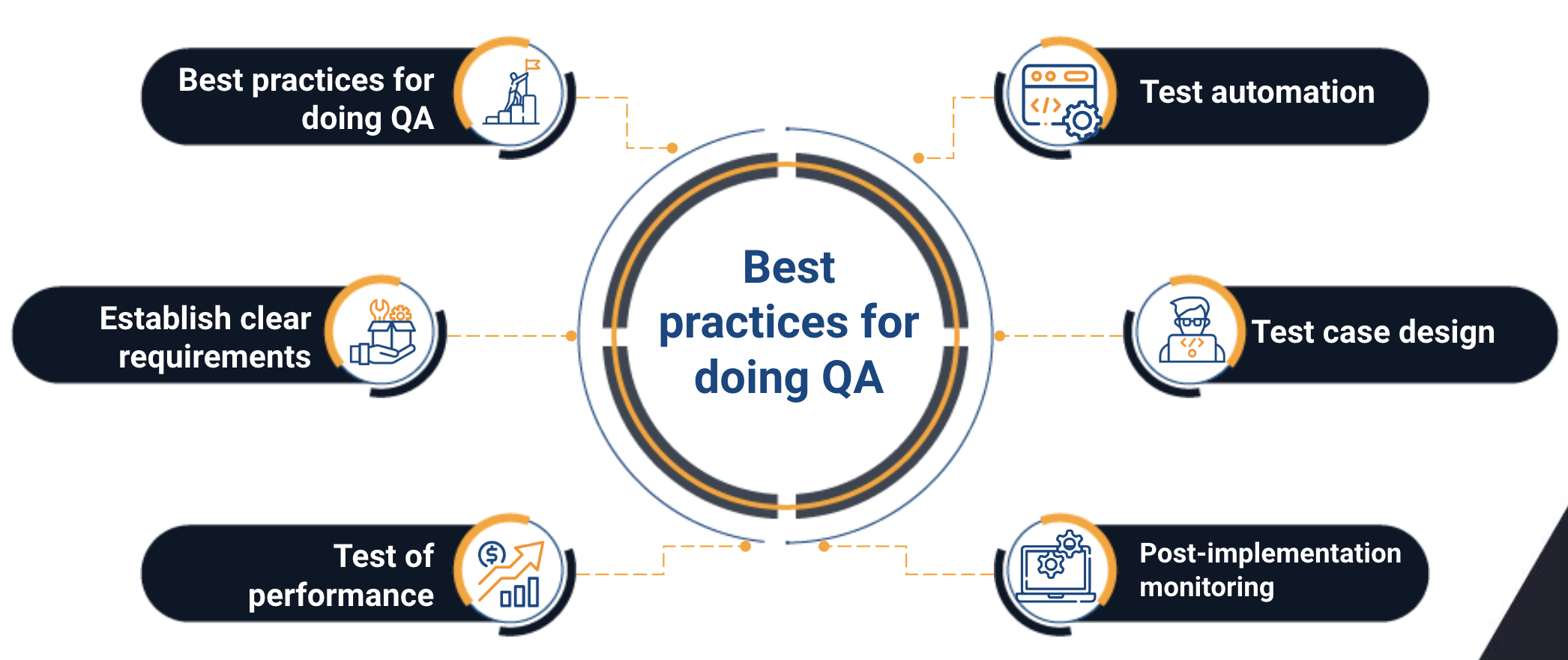
Software quality is a fundamental aspect in the development of computer applications and systems. To ensure a robust, reliable, and error-free final product, it is essential to implement strong Quality Assurance (QA) and testing practices in collaboration with the software development team.
In this blog, we will discuss best practices for carrying out an effective QA and software testing process, thereby ensuring the delivery of high-quality products.
Best practices for doing QA and testing with a software development team
1. Integrate QA from the beginning:
Integrating QA from the initial stages of the development lifecycle is crucial. Involving a specialized software development team in QA from design and planning allows you to identify potential problems and challenges before they become costly obstacles in later phases of development. This also facilitates closer communication between development and QA teams, promoting a shared understanding of requirements and expectations.
2. Establish clear requirements:
Documenting clear and detailed requirements is essential for successful testing. Having a precise understanding of what is expected from the software allows QA specialist software development teams to design relevant and goal-focused test cases. This also serves as a reference point to evaluate the conformity of the product with established standards.
3. Test Automation:
Test automation is an invaluable tool for improving test efficiency and coverage. By automating repetitive and regression testing, you free up the QA team to focus on more complex and exploratory testing. However, it is essential to carefully select which tests are automated to ensure that the development and maintenance effort does not outweigh the benefits gained.

4. Design of effective test cases:
Designing efficient test cases is essential to obtain meaningful test results and this can be perfectly handled by a software development team. Test cases should be comprehensive, focusing on critical scenarios and key software workflows. Furthermore, they must be easily understandable to facilitate execution by the QA team and reproduction by the development team in case problems are found.
5. Performance and scalability testing:
Performance and scalability testing is crucial to evaluate how the software will perform under various load conditions. These tests performed by the software development team should simulate heavy usage scenarios and evaluate the system's ability to handle them. Identifying and addressing performance bottlenecks ensures that software runs efficiently in production environments.

6. Close collaboration between teams:
Collaboration between software development and QA teams is essential to the success of the QA and testing process. Teams must work closely, sharing information about code changes, requirements updates, and test results. Effective communication minimizes the possibility of misunderstandings and speeds problem identification and resolution.
7. Implement continuous testing:
Implementing continuous testing ensures that testing is performed regularly throughout the development cycle. This helps identify problems immediately, allowing for quick fixes and preventing errors from accumulating over time. Continuous integration and continuous delivery (CI/CD) are key practices that support the execution of continuous tests performed by the software development team specialized in QA.
8. Post-implementation monitoring:
Post-deployment monitoring is essential to evaluate software performance in a real production environment. Collecting system usage data and detecting potential issues in real time allows QA and software development teams to quickly address any issues that may arise after implementation.
9. Focus on usability:
It's not just about catching errors, but also ensuring a positive user experience. Including usability testing in the QA process helps evaluate ease of use, navigation, and overall user satisfaction. Identifying and fixing usability issues early in development can have a significant impact on end users' perception of the product.
10. Feedback and continuous improvement:
Constant feedback and the search for improvement opportunities are essential in any QA process. After each development cycle, it is crucial to conduct a thorough review of the tests performed, identify areas for improvement, and adjust strategies and processes as necessary. Continuous improvement ensures adaptability as requirements and technologies evolve.

Executing QA and testing effectively in collaboration with a software development team requires the implementation of best practices from the early stages of development to final delivery.
Software quality is not simply the absence of errors, but the delivery of a product that meets requirements, is reliable, and provides a positive experience to the end user. Adopting these key practices can help ensure the quality and success of software products in an increasingly competitive business environment.
Do you need a software development team to apply QA and testing to your project? At Rootstack, we have +13 years of experience supporting companies in their digital transformation. Contact us!


